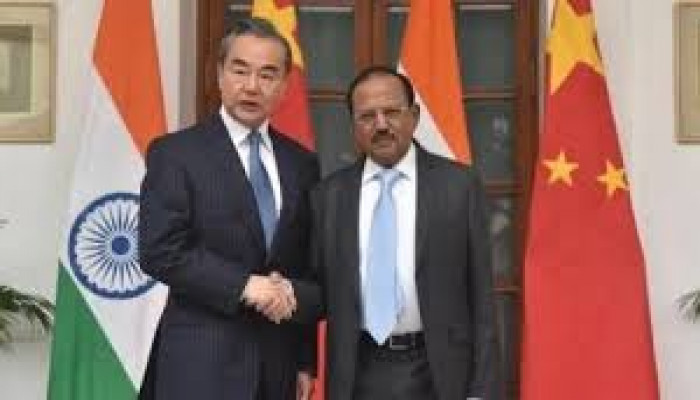Ready to work with India to properly handle situation in border areas: Chinese FM Wang to NSA Ajit Doval
- In Reports
- 08:59 PM, Jul 10, 2024
- Myind Staff
Chinese Foreign Minister Wang Yi has conveyed his willingness to collaborate with India's National Security Advisor Ajit Doval in effectively addressing issues concerning the border situation in eastern Ladakh. This comes amidst the ongoing border dispute between the two nations.
In a congratulatory message to Doval on his reappointment as India's National Security Advisor and Special Representative for the India-China boundary question, Wang highlighted the broadened global importance of the China-India relationship, which extends beyond bilateral matters.
Wang Yi serves not only as China's Foreign Minister but also as the country's Special Representative for the India-China border talks, emphasising his dual role in diplomatic engagements related to border issues between the two nations.
In his message to Ajit Doval sent on July 9th, Wang Yi, who is also a member of the Political Bureau of the ruling Communist Party of China, underscored that China and India, as the two largest developing countries and emerging economies globally, share a relationship that surpasses bilateral boundaries and carries growing global significance.
According to the state-run Xinhua news agency, Wang Yi conveyed his readiness to collaborate with Ajit Doval to implement the significant agreements reached by the leaders of both China and India. His aim is to effectively manage issues concerning the situation on the ground in the border areas and jointly uphold peace and tranquility there. This statement from Wang Yi comes after his recent meeting with India's External Affairs Minister S. Jaishankar in Astana during the Shanghai Cooperation Organisation (SCO) summit in Kazakhstan.
The recent meeting between Indian External Affairs Minister S. Jaishankar and Chinese Foreign Minister Wang Yi in Astana marked the first high-level interaction between the two countries since the formation of Prime Minister Narendra Modi's third-term government, following the recent general elections in India.
Established in 2003, the Special Representatives mechanism was designed to comprehensively address the complex India-China border dispute, which spans 3,488 km. This mechanism is led by India's National Security Advisor (NSA) and the Chinese Foreign Minister.
Despite meeting 19 times, analysts note that the mechanism has yet to achieve significant breakthroughs in resolving the border issues. However, it has proven to be a valuable and effective platform for managing and mitigating recurring tensions between India and China.
Since the violent clash in the Pangong Tso area near Galwan on May 5, 2020, relations between India and China have deteriorated significantly, with trade being an exception. This incident sparked a prolonged standoff along the eastern Ladakh border.
In efforts to resolve the standoff, the two countries have engaged in 21 rounds of Corps Commander-level talks thus far, with an upcoming 22nd meeting. According to the Chinese military, agreements have been reached to disengage from four points: Galwan Valley, Pangong Lake, Hot Springs, and Jianan Daban (Gogra) in eastern Ladakh.
However, India has been urging the People's Liberation Army (PLA) to also disengage from the Depsang and Demchok areas. India asserts that normalising relations with China hinges on restoring normalcy at the borders. In contrast, China maintains that while the boundary issue is significant, it should be managed within the broader framework of bilateral relations. This ongoing standoff underscores the complex dynamics and challenges in China-India relations, with efforts ongoing to find a resolution that addresses both countries' concerns along the border.
Image source: The Indian Express







Comments